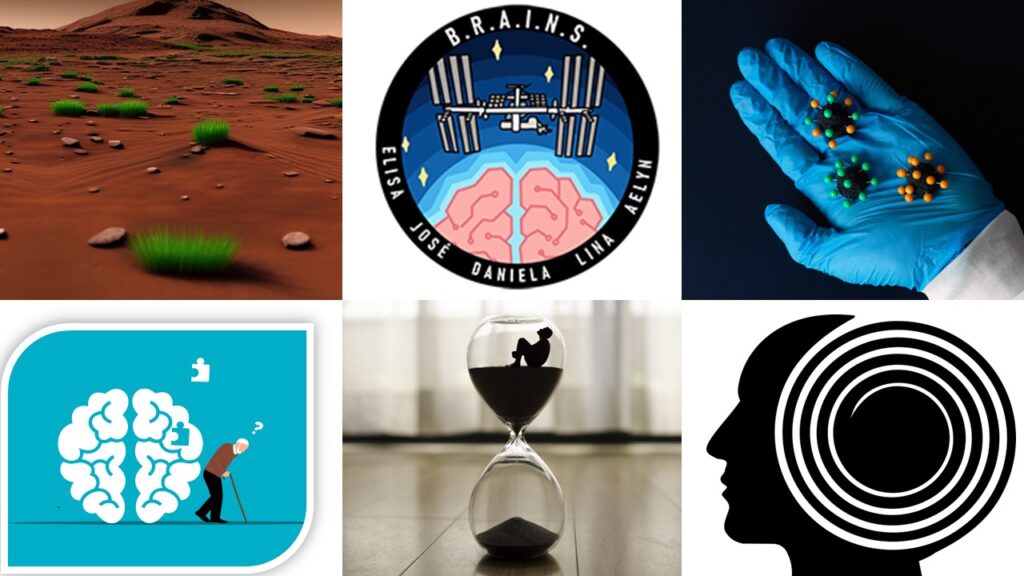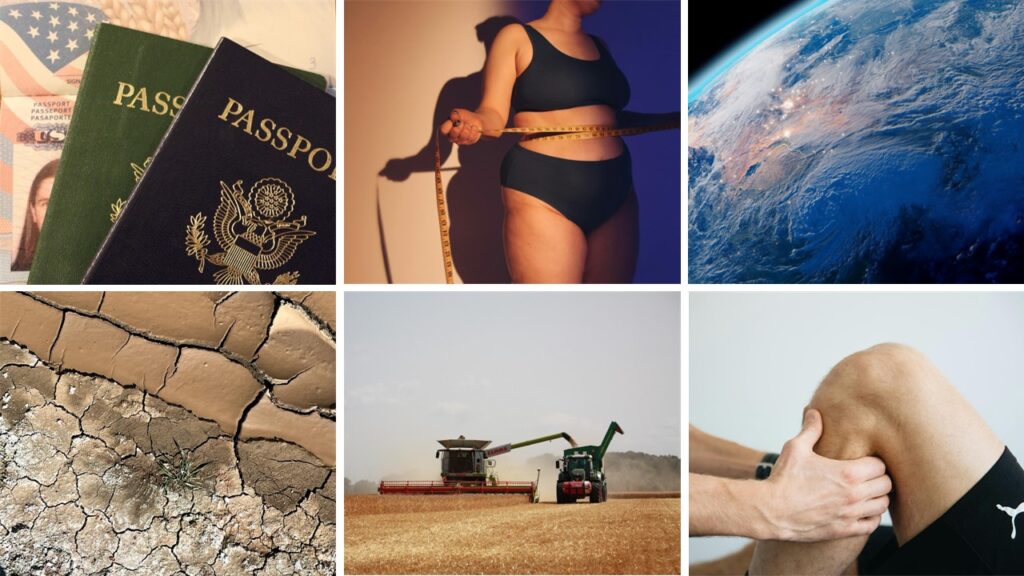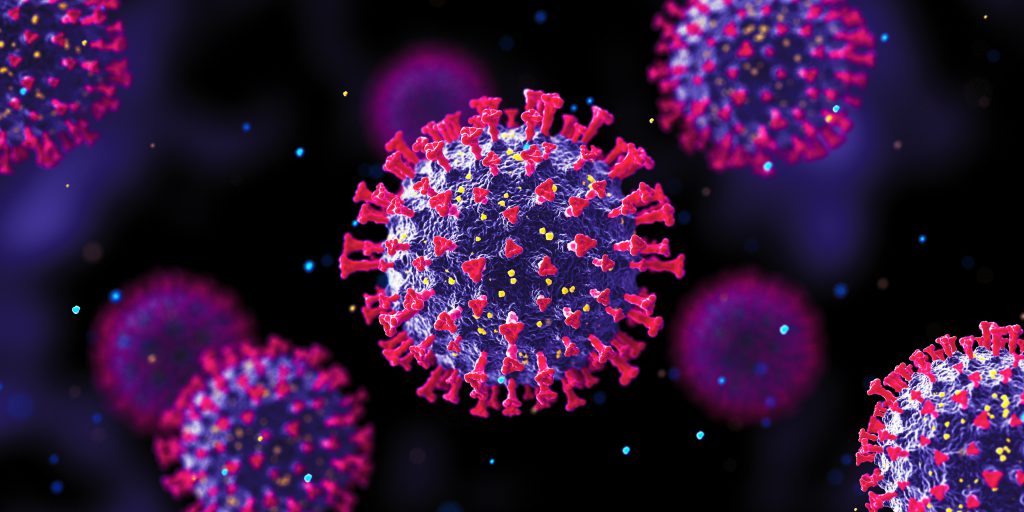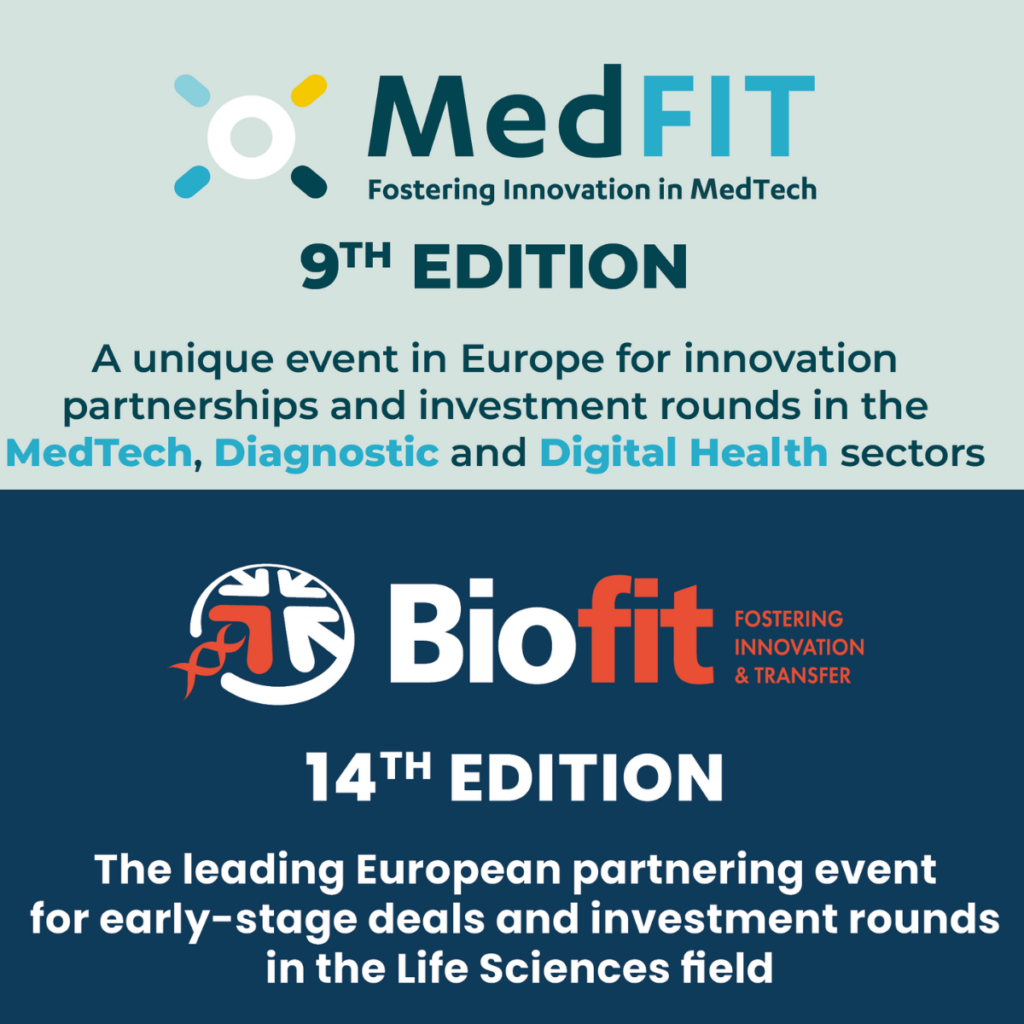10 selected Research Luxembourg results – March 2023
03 May 2023

Luxembourg News in Science & Research
Mini brains in space; a vegetable garden on Mars; the biological age of our cells: here are some of the latest science news from Luxembourg.
Aelyn Chong Castro, Flickr, Pixabay, Craiyon AI
Luxembourg students send five ‘mini brains’ to the ISS
Luxembourg Centre for Systems Biomedicine (LCSB), Interdisciplinary Centre for Security, Reliability and Trust (SnT), University of Luxembourg
Growing mini brains in space? Far from being science fiction, this is the very real challenge taken up by a team of students from the University of Luxembourg. Their project, entitled BRAINS (Biological Research using Artificial Intelligence for Neuroscience in Space), consists of growing three-dimensional cell cultures, also known as ‘organoids’, on the ISS (NASA’s International Space Station). The aim of this project is to obtain new knowledge about neurodegenerative diseases such as Parkinson’s.
The ‘organoids’ are made from stem cells that mimic the human brain, and in the microgravity of the ISS they can grow larger and more complex than on Earth. These ‘organoids’ have been placed in a box specially designed by the SnT: the CUBE LAB, which provides them with all the necessary nutrients without external intervention.
The first results are expected in the coming weeks – stay tuned!
To the press release / To the publication
Will we ever be able to garden on Mars?
Luxembourg Institute of Science and Technology (LIST)
It looks like a good start! A team from LIST has succeeded in growing a beautiful and very resistant plant, ryegrass, in soil similar to that found on Mars. Called ‘Martian regolith’ or MMS-1, it is composed of basaltic material simulating the chemical and mechanical properties of the soil on the Red Planet.
Despite some signs of stress, the ryegrass grew for a fortnight, even withstanding its first mowing. Genetic analysis revealed changes that allowed the plant to adapt and survive.
The results improve the understanding of plant growth on MMS-1, which will not only be useful for the development of a Martian vegetable garden, but also for oxygen production and planning for possible construction work – all with the important goal of one day extending the human presence in the universe.
To the press release / To the publication
Chemicals in our products: the Scan4Chem app finally sheds some light
Luxembourg Institute of Science and Technology (LIST)
If you are a cautious consumer who does not like to grope around in the dark, this free application from LIST will enlighten you about the harmful substances, known as SVHC (Substances of Very High Concern), contained in your products.
Scan4Chem was created as part of a major European SVHC awareness campaign. Already downloaded 127,000 times, it allows you to find out if a consumer product (non-food) contains SVHCs by scanning its barcode. If the information is not available, the application exercises a “right to know”: it sends a request to the supplier of the item, who is asked to respond within 45 days.
The application is an integral part of the European AskREACH project, which aims to help policymakers and industry improve the traceability of SVHC. The final conference was recently held in Brussels, which provided an opportunity to review the success of Scan4Chem.
To the press release / To the publication
What is the impact of SARS-CoV-2 infection on our gut flora?
Luxembourg Centre for Systems Biomedicine (LCSB), Luxembourg Institute of Health (LIH), Research Luxembourg
It has long been known that even a mild SARS-CoV-2 infection can have long-term health consequences. A new LCSB study reveals a likely cause: the virus is thought to alter the composition and functionality of the gut microbiome of infected individuals, creating an increased vulnerability to subsequent microbial infections, but also persistent gastrointestinal disorders.
The results of the study, published in Microbiome, show a striking increase in virulence factors (which help bacteria invade and colonise the host), as well as increased expression of antimicrobial resistance genes (which determine bacterial resistance to antibiotics), in patients with mild to moderate forms of COVID-19.
The data analysed are from the Luxembourg cohort studies Predi-COVID and CON-VINCE.
More information / To the publication
What do we know about the next worrying variant of SARS-CoV-2?
Laboratoire National de Santé (LNS)
END-VOC, a European project of which the LNS is a part, has published a recent paper on new variants of SARS-CoV-2. To date, 5 have already been identified, but only Omicron is still circulating in humans.
The next one, Pi, could emerge under different conditions: in immunocompromised patients on the one hand, because in this context the virus has enough time to acquire combinations of mutations that are more efficient than during sequential transmission in immunocompetent hosts.
Another possibility is the emergence in certain animal reservoirs (mink, deer): recombination with other coronaviruses could indeed create hybrid viruses with increased virulence or immune escape potential.
And finally, regions of the world without adequate genomic monitoring require improved surveillance to detect the emergence of a new lineage in time.
To the press release / To the publication / More information
Is there a correlation between poverty and risk of dementia?
Faculty of Humanities, Education and Social Sciences (FHSE), University of Luxembourg
Poverty is correlated/associated with many health problems. Dementia has now been added to the list, as demonstrated by Prof. Anja Leist and Mathias Klee from the University of Luxembourg.
The researchers studied the role of socio-economic status in the development of dementia, independently of genetic and environmental factors. They found that both individual and regional poverty contributed to the risk of developing a neurodegenerative disease such as Alzheimer’s. The study, published in the American Journal of Preventive Medicine, involved nearly 200 000 participants.
These results are particularly interesting for better preventing the onset of dementia. This could lead to preventive measures being targeted at households and areas with socio-economic difficulties, irrespective of genetic vulnerability.
To the press release / To the publication

How are women doing in Luxembourg?
On the occasion of International Women’s Day on 8 March, STATEC published some interesting statistics on the life of women in Luxembourg. In particular, the pay gap between men and women has been reversed for the first time: women’s hourly wages have indeed exceeded men’s in 2021. Let us not forget that in all other EU countries, this indicator remains in favour of men.
The female employment rate will increase slightly in 2021. However, parity has been impacted by the pandemic: there is a clear divergence in unemployment rates between the two sexes, to the detriment of women. Life expectancy in good health is 62.4 years for women and 64 years for men.
Fertility is decreasing, with 1.24 children per Luxembourg woman.
To the press release (French) / More information (French)
How old are our cells? An RNA clock measures our biological age
Luxembourg Centre for Systems Biomedicine (LCSB)
This rather special clock was designed by the team of Prof. Antonio Del Sol from the LCSB to measure the biological age of our cells – the age that really reflects the state of our body and its regenerative capacities. Indeed, as we age, our cells progressively lose their ability to perform their functions properly, leading to all the well-known dysregulations of old age.
Published in Aging Cell, the publication presents the specificities of this new RNA clock called MultiTIMER. The clock assesses a set of cellular processes and their associated genes that are predictive of biological age using machine learning methods. It would also provide information on deregulated cellular functions.
The calculation of the biological age of cells is of interest for developing new anti-ageing strategies.
To the publication / More information
How did people speak Luxembourgish in the Middle Ages?
Faculty of Humanities, Education and Social Sciences (FHSE), University of Luxembourg
For those interested in the history and language of Luxembourg, it is now possible to acquire the 12 volumes tracing the accounts of the City of Luxembourg, written entirely in old Luxembourgish. Indeed, the medieval spelling has been scrupulously respected, which makes them a treasure trove for language historians. This makes it possible to study in detail the phenomena of change in language and writing. The accounts also show that the extension and maintenance of the city walls was the most important expenditure of the city in the past.
The 70 income and expenditure registers, which are kept in the City Archives, were transcribed and edited in a long research project conducted from 2007 to 2023 by Profs. Michel Pauly and Martin Uhrmacher of the FSHE.
To the press release (French) / To the publication (French)
Does psychological status have an impact on the prognosis of COVID-19?
Luxembourg Institute of Health (LIH)
Unfortunately, yes. This is the conclusion of a recent LIH study published in Frontiers in Public Health: regular use of psychotropic drugs such as antidepressants and anxiolytics (and therefore the presence of psychological disorders) before the initial infection would be associated with a less favourable evolution of COVID-19. More specifically, the symptoms of SARS-CoV-2 infection would be more severe, the overall prognosis less favourable and the recovery time longer. In addition, the risk of developing Long COVID would also be increased.
These results are part of an approach to optimise and personalise care according to the specificities of each patient. The data analysed come from the Predi-COVID study, which is part of the CoVaLux initiative. 791 patients tested positive for SARS-CoV-2 were followed by the researchers.
To the press release / To the publication








